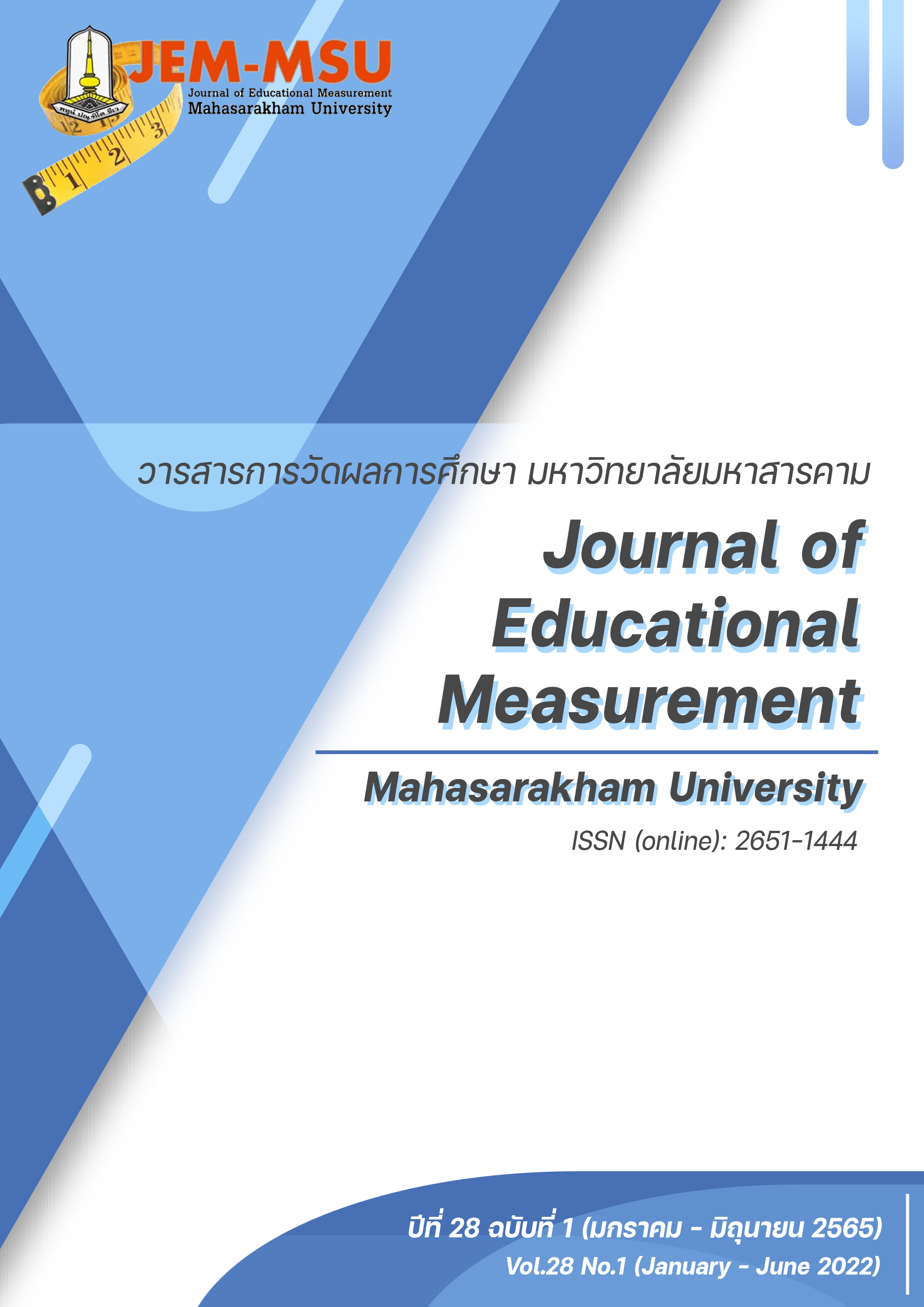Comparison of Q-Matrix Validations for a Cognitive Diagnostic Test between Expert Judgement Method and PVAF Index Method
Main Article Content
Abstract
The purpose of this research was to compare the quality of two Q-matrix validation methods which were the expert judgement method and the PVAF index method, for a cognitive diagnostic test. The cognitive diagnostic test in this research was a 4-choice test which contained 40 questions. Each item aimed to measure one to three attributes. The sample of this research consisted of 225 grade 10 students in Bangkok, in the academic year 2020. The result of this research was obtained by using G-DINA Model as a cognitive diagnostic model. The R Program was applied to analyze the quality of Q-matrix with PVAF index method.
The result of this research showed that the Q-matrix validated by the expert judgement method could measure the students’ attributes more accurately than the PVAF index method, based on the developed Q-matrix, as the expert judgement method could specify Q-matrix without any misspecifications. Meanwhile, the PVAF index method showed only 22 items (55.0%) from 40 items that were correctly specified, compared to the developed Q-matrix, and 9 items (22.5%) were incorrectly specified, compared to the developed Q-matrix, and there were 9 items (22.5%) that attributes could not be specified.
Article Details

This work is licensed under a Creative Commons Attribution-NonCommercial-NoDerivatives 4.0 International License.
The content and information contained in the published article in the Journal of Educational Measurement Mahasarakham University represent the opinions and responsibilities of the authors directly. The editorial board of the journal is not necessarily in agreement with or responsible for any of the content.
The articles, data, content, images, etc. that have been published in the Journal of Educational Measurement Mahasarakham University are copyrighted by the journal. If any individual or organization wishes to reproduce or perform any actions involving the entirety or any part of the content, they must obtain written permission from the Journal of Educational Measurement Mahasarakham University.
References
de la Torre, J. (2011). The generalized DINA model framework. Psychometrika, 76(2), 179–199. https://doi.org/10.1007/s11336-011-9207-7
de la Torre, J. & Chiu, C. (2016). A General Method of Empirical Q-matrix Validation. Psychometrika. 81. 10.1007/s11336-015-9467-8. Finn, B., 2015. Measuring Motivation in Low-Stakes Assessments. ETS Research Report Series, 1–17. https://doi:10.1002/ets2.12067
Jang, E.E. & Wagner, M. (2013). Diagnostic Feedback in the Classroom. In The Companion to Language Assessment, A.J. Kunnan (Ed.). https://doi.org/10.1002/9781118411360.wbcla081
Johnson, R. L., Penny, J. A., & Gordon, B. (2009). Assessing performance: Designing, scoring, and validating performance tasks. Guilford Press.
Ma, W., & de la Torre, J. (2020a). An empirical Q-matrix validation method for the sequential generalized DINA model. The British journal of mathematical and statistical psychology, 73(1), 142–163. https://doi.org/10.1111/bmsp.12156
Ma W, de la Torre J. (2020b). GDINA: An R Package for Cognitive Diagnosis Modeling. Journal of Statistical Software, 93(14), 1–26. doi: 10.18637/jss.v093.i14.
Nájera, P., Sorrel, M. A., & Abad, F. J. (2019). Reconsidering cutoff points in the general method of empirical Q-matrix validation. Educational and Psychological Measurement, 79(4), 727–753. https://doi.org/10.1177/0013164418822700
Qin, C., Jia, S., Fang, X., & Yu, X. (2020). Relationship validation among items and attributes. Journal of Statistical Computation and Simulation, 90(18), 3360-3375.
Waugh, C. K., & Gronlund, N. E. (2013). Assessment of Student Achievement (10th ed.). Pearson.
Office of the Education Council. (2019). Guidelines for Development of Students Competency at the Basic Education Level (1st ed.). Ministry of Education Thailand, 1-15. (in Thai)
Kanjanawasee, S. (2013). Classical Test Theory (7th ed). Chulalongkorn University. (in Thai)
Meesakul, S., Naiyapatana, O., Khampalikit ., & Kritkharuehart, S. (2015). The Study for the Efficiency of Diagnostic Classification Models. Research Methodology & Cognitive Science, 13(1), 27-37. (in Thai)
Chaimongkol, N. (2017). Assessment for Cognitive Diagnosis. Journal of The Social Science Research Association of Thailand. 4(1), 14-23. (in Thai)


